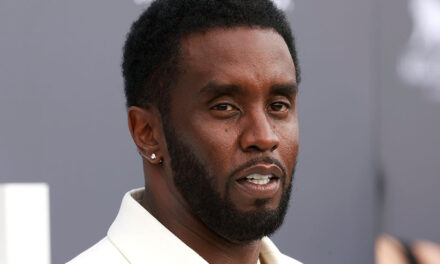We support our Publishers and Content Creators. You can view this story on their website by CLICKING HERE.
Scenes like these have become so commonplace, they barely register: a group of men carrying sacks of flour are mown down where they stand by an Israeli strike, a massacre whose only purpose is to enforce mass starvation.
(Article by David Hearst republished from MiddleEastEye.net)
To publish unblurred photographs of this massacre is to risk having the content banned on social media websites, so I will describe the scene in words.
A line of flour and body parts stretches into the distance of northern Rafah. An Israeli air strike had struck a tuk-tuk vehicle near an aid distribution point in the Miraj area.
Seven bodies lie sprawled in various poses of sudden death, although we know that a total of 11 were killed. In the foreground, one man lies on top of another, red ribbons of blood stretching from the brains of the man beneath.
Behind him lies a man on his side. Rivulets of blood stretch away from him too. His clothes are covered in white dust, for behind him are the scattered remains of the sack of flour he was carrying.
A horse and cart plods across. A boy walks away. Bystanders look on stunned, not knowing what to do. Flour is precious. Human life is not.
As this was happening, US Secretary of State Antony Blinken let it be known that he was “happy with the number of aid trucks Israel was letting in”, and would not apply sanctions as his country had threatened to on 13 October.
His officials said Israel had taken “important steps” to address US concerns regarding the humanitarian situation in Gaza, but did not elaborate as to what these were.
No doubt, Blinken was speaking on autopilot. But his optimism that aid was getting through was not shared by Unrwa, the United Nations agency for Palestinian refugees, which reported that October saw the lowest amount of food entering Gaza in a year.
Look in the mirror
Nor was it confirmed by the increasingly confident enforcers of mass starvation themselves.
Brigadier General Itzik Cohen told Israeli reporters that “there is no intention of allowing the residents of the northern Gaza Strip to return”, adding that humanitarian aid would be allowed to “regularly” enter the south of the territory, but there were “no more civilians left” in the north.
His comments were walked back by superior officers almost as soon as they were uttered, because they were de facto evidence of two war crimes: using starvation as a weapon and forcible transfer.
If Democrats really want to find out why significant numbers of their voter base – college-educated youths, Arab Americans and Muslims – deserted a candidate of “joy” for the “forces of darkness”, this is the reason why.
Joyful Kamala Harris owns the scenes taking place in Gaza and Lebanon every day as much as President Joe Biden or Blinken do. She has never distanced herself from the Gaza policy of her administration. As she herself has said, she was in the room when decisions were taken.
My message to them is this: don’t look anywhere else for your defeat. It’s all there in the mirror in front of you.
The same applies to anyone who continues to argue that Israel should now “finish the job” – code for accelerating starvation, forcible transfer and mass murder.
This is the collective mindset that president-elect Donald Trump is filling his cabinet with.
Posing as the “stop the war” candidate, Trump told the credulous imam of Hamtramck, Detroit, that he would bring peace. And in one of the most cynical electoral stunts, the imam and his colleagues duly appeared on the platform with Trump.
Within days of the election, Trump had already begun filling his cabinet with people who have made every case for Israel to spread the war around the region.
Trump’s picks
There’s Mike Waltz, touted by Trump’s social media site Truth Social as an “expert on the threats posed by China, Russia, Iran and global terrorism”.
Waltz, who is going to be Trump’s national security adviser, told Fox News in September that a ceasefire and hostage release deal would not end the conflict. “Iran will continue to stoke unrest because they want to destroy Israel,” he said. “Making concession after concession to Iran is actually what is destabilising the situation.”
Waltz is a dedicated enemy of ceasefires. So, too, is Vivek Ramaswamy, who along with Elon Musk will lead a “Department of Government Efficiency”.
Ramaswamy said: “I have full confidence that if left unrestrained, the [Israeli army] will be able to get the job done on defending Israel.”
There’s Trump’s ambassador to Israel, Christian evangelist Mike Huckabee. There are certain words the forthcoming US ambassador refuses to use: “There is no such thing as a West Bank. It’s Judea and Samaria. There’s no such thing as a settlement. They’re communities, they’re neighbourhoods, they’re cities. There is no such thing as occupation,” he told CNN in 2017.
There is Pete Hegseth, who told Fox News: “I think this is a moment for the Israeli government, not the US government, to take action against Iran to prevent an Iranian bomb. The West has said forever that we cannot have Iran, the mullahs with a nuclear shield … Imagine what the region and the world would look like. Israel has already done a lot of covert things to push them back, assassinating, hacking into their facilities, damaging their centrifuges. They are going to do more of that, because clearly this administration is not going to.”
That is the designate secretary of defence speaking.
For the most important job of US secretary of state, Trump has selected Marco Rubio, who wrote after his last trip to Israel (his fourth one): “Israel’s enemies are also our enemies. The Iranian regime and its proxies – Hamas in Gaza, Hezbollah in Lebanon, the Houthis in Yemen, and a multitude of groups in Syria and Iraq – seek Israel’s destruction as part of a multi-stage plan to dominate the Middle East and destabilize the West. The Jewish state is on the front lines of this conflict, fighting with many shared American-Israeli lives.”
Rubio finds it nothing less than outrageous that the International Criminal Court is mulling arrest warrants for Israeli Prime Minister Benjamin Netanyahu and senior army officers: “The court isn’t going after Assad in Syria, who gassed his own people. It isn’t going after Xi Jinping in China, who is conducting real-time genocide against the Uyghurs. Instead, it’s attacking a country whose military has gone to great lengths to protect civilian lives. The hypocrisy is astounding.”
And who better to appoint as your special envoy to the Middle East than your golfing partner?
Steve Witkoff, a New York real estate developer, said of Netanyahu’s recent address to the joint houses of Congress: “It felt spiritual and yet, that’s not the reaction you sense that you were getting from many of those Democrats.”
This is the chorus that is supposed to guide the new president to end all wars in the Middle East and beyond.
Israel’s post-Gaza plan
But that is just one side of a developing picture. The other involves Israel’s plans for a Trump administration, which are coming into focus.
Netanyahu’s special adviser and strategic affairs minister, Ron Dermer, has already been dispatched to Trump’s residence at Mar-a-Lago in Florida to hammer out what issues Trump wants to see resolved before 20 January, when the new president takes over, and what he prefers that Israel leave for him.
Dermer took with him intelligence on Iran’s nuclear programme and the potential threat of Tehran “advancing toward nuclear armament”.
Dermer did not leave Florida without checking in with Trump’s son-in-law, Jared Kushner, whose plans for a waterfront development in Gaza delighted Israeli officials.
Sounding ever more like a mainstream voice, Finance Minister Bezalel Smotrich said that the time had come to annex the West Bank, instructing officials overseeing settlements “to begin professional and comprehensive staff work to prepare the necessary infrastructure” for extending sovereignty.
And as we reported earlier, Daniella Weiss, the leader of Nachala, an orthodox settler movement, is waiting for Palestinians to “disappear from Gaza”, for she has thousands of Jews waiting to resettle there.
But the most significant thing to be said by a government minister was a detailed speech by Israel’s latest foreign minister, Gideon Saar.
In an implicit acknowledgement that Israel will not find peace by getting signatures on a piece of paper from Arab heads of state, Saar said Israel’s natural allies in the region were its oppressed minority groups who were stateless. He mentioned Kurds and the Druze by name.
Speaking of the Kurds, Saar said: “It is a national minority in four different countries, in two of which it enjoys autonomy: de facto in Syria and de jure in the Iraqi constitution.” Kurds are “a victim of oppression and aggression from Iran and Turkey”, he said, adding that “this has both political and security aspects” for Israel.
Recipe for regional war
It’s not a secret that Israel has been supporting the Kurdistan Democratic Party, which dominates the semi-autonomous Kurdistan region in Iraq. Israel was the only country to support an independence referendum hosted in the Kurdistan Regional Government in 2017, which Baghdad refused to recognise.
On the other hand, the Kurdish People’s Protection Units, which controls much of northeastern Syria, is an offshoot of the Kurdistan Workers’ Party, which has been conducting an insurgency in Turkey for decades, and both are long-time supporters of Palestine.
But for anyone sitting in Turkey or Iran, Saar’s statement is a direct threat of military interference by Israel itself.
Unsurprisingly, Turkish President Recep Tayyip Erdogan cut off all relations with Israel on Wednesday.
In leaking its talks with US envoy Amos Hochstein, Israel has made its plan for Lebanon, Syria and Iraq clear. It wants not only to push Hezbollah back north of the Litani River and cut its supply route from Iran, through Syria and Iraq; but also to dismantle, or at least profoundly weaken, the axis of resistance that Iran has built up from well before the US invasion of Iraq – although that debacle greatly accelerated Iran’s regional influence.
Saar’s opening shot is a recipe for regional war. It makes Syria the next target for ground operations. It threatens the two most powerful armies outside of Israel – Turkey and Iran – and it’s a direct challenge to each country’s regional sphere of influence.
And the Palestinians? For them, Trump and Israel will dust the cobwebs off the “deal of the century”, and – if they are lucky, stay quiet and put away all national pretensions like their flag – they can exist as guest workers, whose huts will be on a corner of the desert border with Egypt.
By the way, even Trump’s 2020 map of Palestine, shocking as it was when it was first published, will have substantially shrunk by today, if northern Gaza is resettled and Israel annexes two-thirds of the West Bank.
Unprecedented escalation
I cannot say how much, if any, of these plans will see the light of day. I do know that the Arab world has changed in the last 13 months beyond recognition. Trump’s team is not returning to the same playground it fooled around in back in 2017.
For evidence of this, I turn to Marwan Muasher, Jordan’s former foreign minister and its first ambassador to Israel. Muasher was one of the authors of the Arab Peace Initiative of 2002, the last serious attempt to negotiate a two-state solution with Israel. If anyone has dedicated his career as a diplomat to negotiating peace with Israel, it is he.
Today, this is what he told me: “[The] public, not just in Jordan but across the Arab world, has been very radicalised by October 7 today, and no one wants to talk peace today. You know, a majority of people now think that the only way to end the occupation is through armed resistance, and that has never been the case, even among Palestinians.
“Sixty-five percent of Palestinians in the West Bank and Gaza, in a poll done after October 7, think that the only way to end the occupation is through armed resistance. And of course, more than 80 percent of the Israelis do not want a two-state solution. Netanyahu has called the two-state solution a reward for terrorism. So this is where we are now.”
Muasher now thinks that only a solution based on ending the occupation will end the conflict. That can only be achieved through equal citizenship for all who live between the river and the sea, he said.
Trump, or any future US president, would be wise to listen to this voice. Biden’s instinctive Zionism and Trump’s Christian evangelism are doomed as the supporters of a Zionist project that has failed. Today, Israel is a different place, incapable of functioning as a state for all its people. So, too, has the Arab world been radicalised to carry the fight to Israel on all its borders.
By moving the US embassy to Jerusalem, allowing Israel to annex the Golan Heights, and inventing the Abraham Accords, Trump’s first term in office created the conditions for Hamas’ attack on October 7.
In a second term, and with a cabinet composed of people who parrot Israel’s plans to extend its war to Syria, Iraq and Iran, Trump is quite capable of triggering a regional conflict beyond either America’s or Israel’s control.
Read more at: MiddleEastEye.net

 Conservative
Conservative  Search
Search Trending
Trending Current News
Current News 





